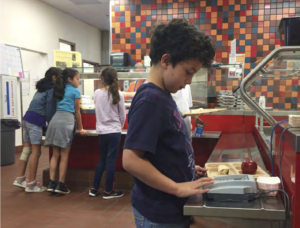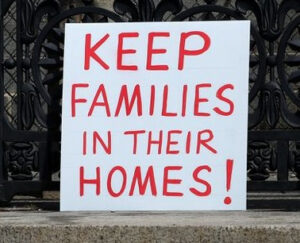Reconsidering Welfare Reform
 Twenty-five years ago this week, President Clinton signed “The Personal Responsibility and Work Opportunity Reconciliation Act” – better known as the Welfare Reform Act – into law. The bill was controversial at the time, especially among anti-poverty advocates who worried that the law’s impact on people living in poverty would be significant and significantly harmful.
Twenty-five years ago this week, President Clinton signed “The Personal Responsibility and Work Opportunity Reconciliation Act” – better known as the Welfare Reform Act – into law. The bill was controversial at the time, especially among anti-poverty advocates who worried that the law’s impact on people living in poverty would be significant and significantly harmful.
Turns out our fears were very much founded.
The results of the law have been devastating. Income inequality has grown exponentially in the last thirty years. According to the Center for Budget and Policy Priorities, “the best survey data show that the share of wealth held by the top 1 percent rose from 30 percent in 1989 to 39 percent in 2016, while the share held by the bottom 90 percent fell from 33 percent to 23 percent.” There are many structural reasons for the concentration of wealth, not the least of which is the fact that sometime in the 1970s, wages and productivity decoupled, meaning that while people were working longer hours, that hasn’t been reflected in their paycheck. But it’s also not difficult to imagine that our porous social safety net has also played a role.
As inequality becomes more prevalent in our society and poverty ever more punitive, we all realize that the time has come to rebuild our safety net. It’s time to reform welfare reform. (more…)
MLRI Applauds Passage of Meal Debt Legislation in the Massachusetts House of Representatives
 Last week, the Massachusetts House of Representatives passed An Act Promoting School Nutrition (H.3999), which will address the challenge that children and families living in poverty face when it comes to unpaid school meal debt. That legislation, championed in the House by State Reps. Andres X. Vargas of Haverhill and Sean Garballey of Arlington, will both ensure that more students have access to free school meals and prevent school business practices that effectively punish or embarrass students when their families incur meal debt. The Senate is pending action on a similar bill filed by Senate Majority Leader Cynthia Stone Creem, S. 298.
Last week, the Massachusetts House of Representatives passed An Act Promoting School Nutrition (H.3999), which will address the challenge that children and families living in poverty face when it comes to unpaid school meal debt. That legislation, championed in the House by State Reps. Andres X. Vargas of Haverhill and Sean Garballey of Arlington, will both ensure that more students have access to free school meals and prevent school business practices that effectively punish or embarrass students when their families incur meal debt. The Senate is pending action on a similar bill filed by Senate Majority Leader Cynthia Stone Creem, S. 298.
Patricia Baker, MLRI’s food security expert, noted:
“This legislation represents a major step by the Massachusetts House of Representatives toward boosting federal nutrition dollars for local schools and reducing the burden of school meal debt on families with children. In addition to requiring more schools with high numbers of low-income students to provide universal free meals, this legislation prevents schools from involving or punishing students for meal debt. As we work toward universal school meals for all, we deeply appreciate Speaker Mariano and House leadership in passing Rep Vargas’ bill.”
In 2018, the Massachusetts Law Reform Institute issued a report that looked at unpaid school meal policies in 154 Massachusetts school districts and how they can become punitive towards children in low-income households. We also looked at how some other states across the nation were addressing this practice, a summary of which you can find in this opinion piece at WBUR. (more…)
Facing Eviction or Worried About Paying Rent? Help Is Available

On July 31st, the federal eviction moratorium, put in place as the pandemic took hold in 2020 by the U.S. Centers for Disease Control, expired. On August 3rd, the Biden Administration announced a moratorium that is similar but does not presently cover all Massachusetts residents – but it will give the Commonwealth time to act on the COVID Housing Equity bill, which we at MLRI are working diligently to see passed.
The reality is that even today tenants across Massachusetts continue to be at risk of eviction during this escalating public health crisis. Advocates fear confusion around the CDC order will result in displacement, and its expiration will bring a new wave of eviction cases. It’s worth noting that when the state allowed its moratorium to expire last fall, more than 19,000 people were sued for eviction and thousands of pending cases that were on hold resumed making their way through the court system.
At MLRI, we are urging tenants not to panic, not to move out, and to seek rental assistance and legal aid. The silver lining to this very dark cloud is that there are unprecedented amounts of federal funds available to help with rent and mortgage payments, utility assistance, and moving expenses. Tenants should apply immediately for assistance. There are also free legal services lawyers available to provide advice and representation, and community organizations to offer support and information. (more…)
